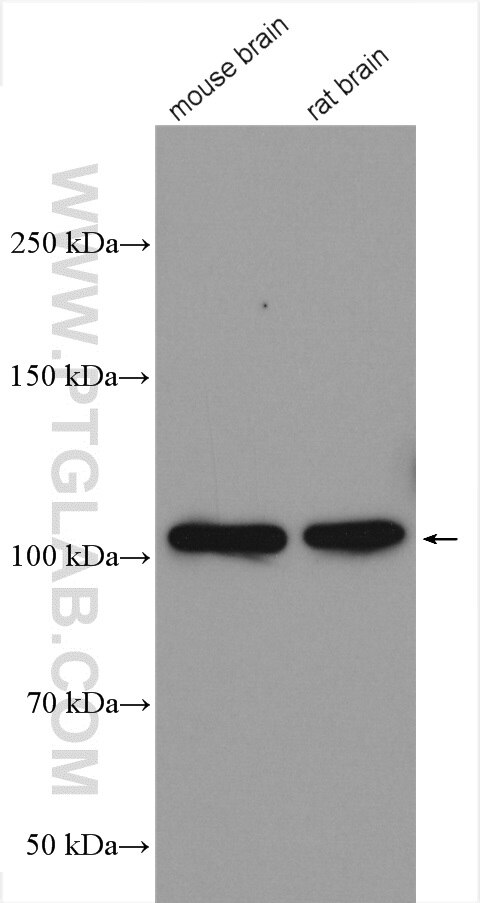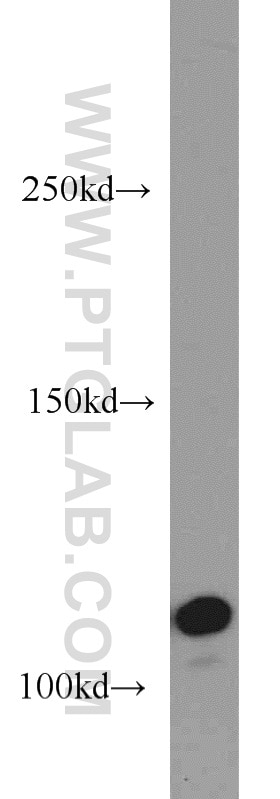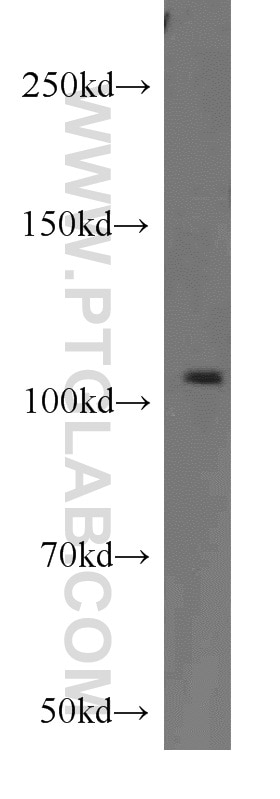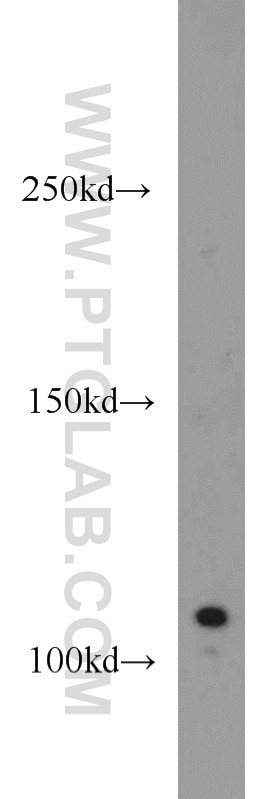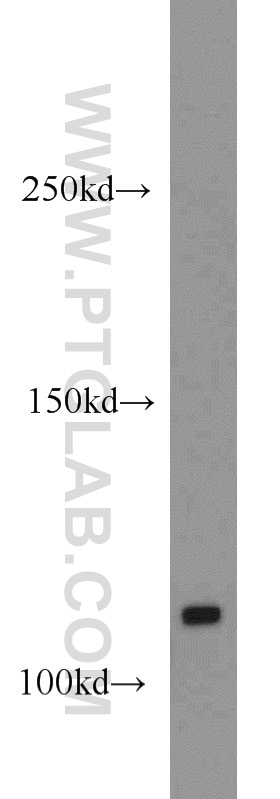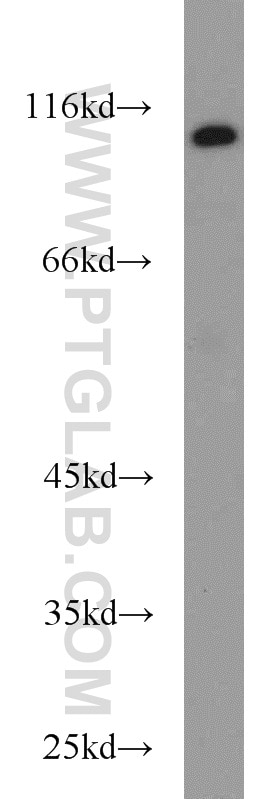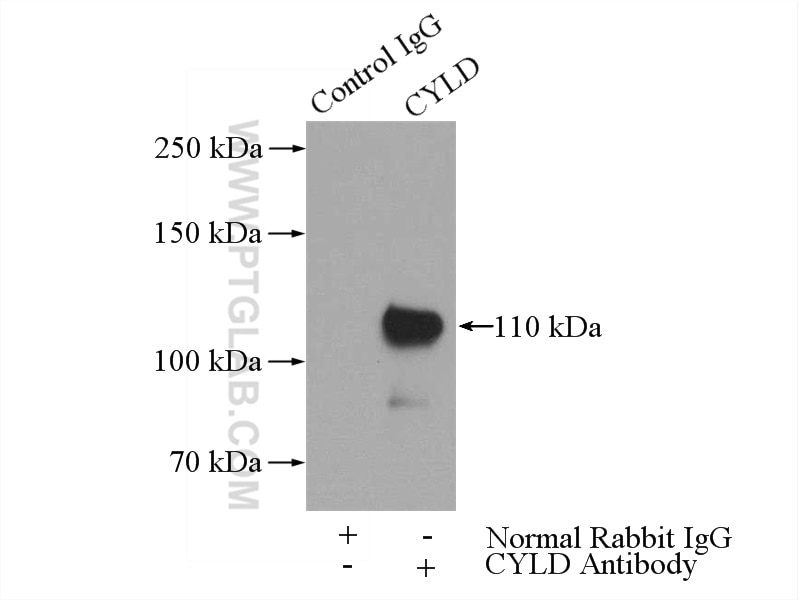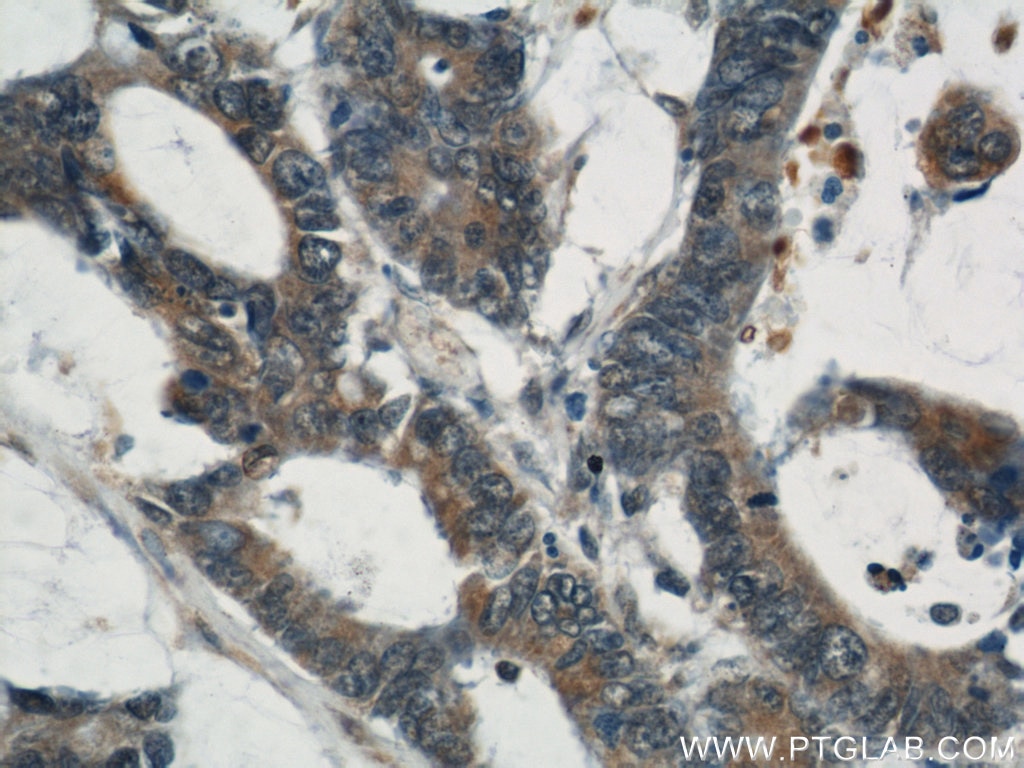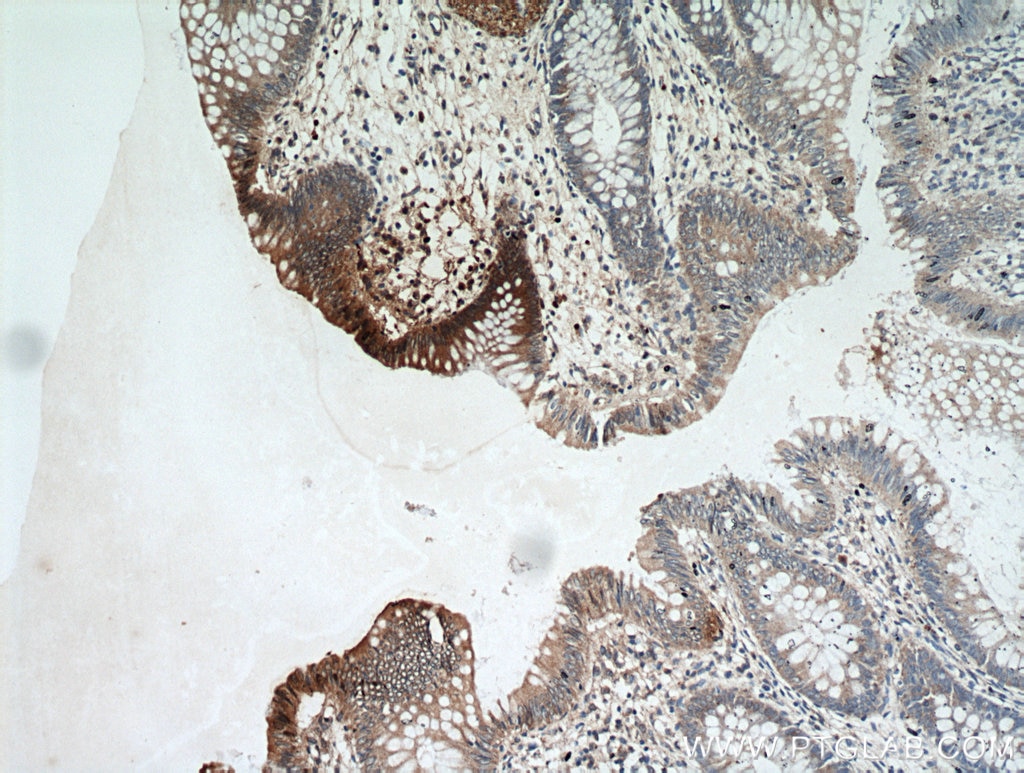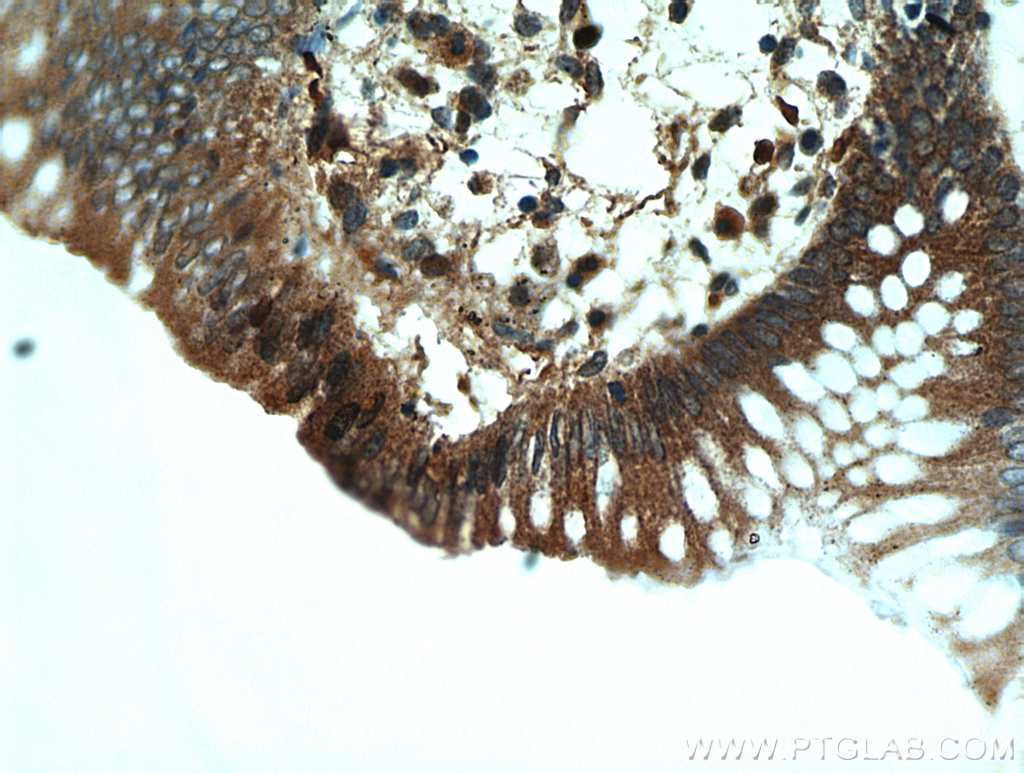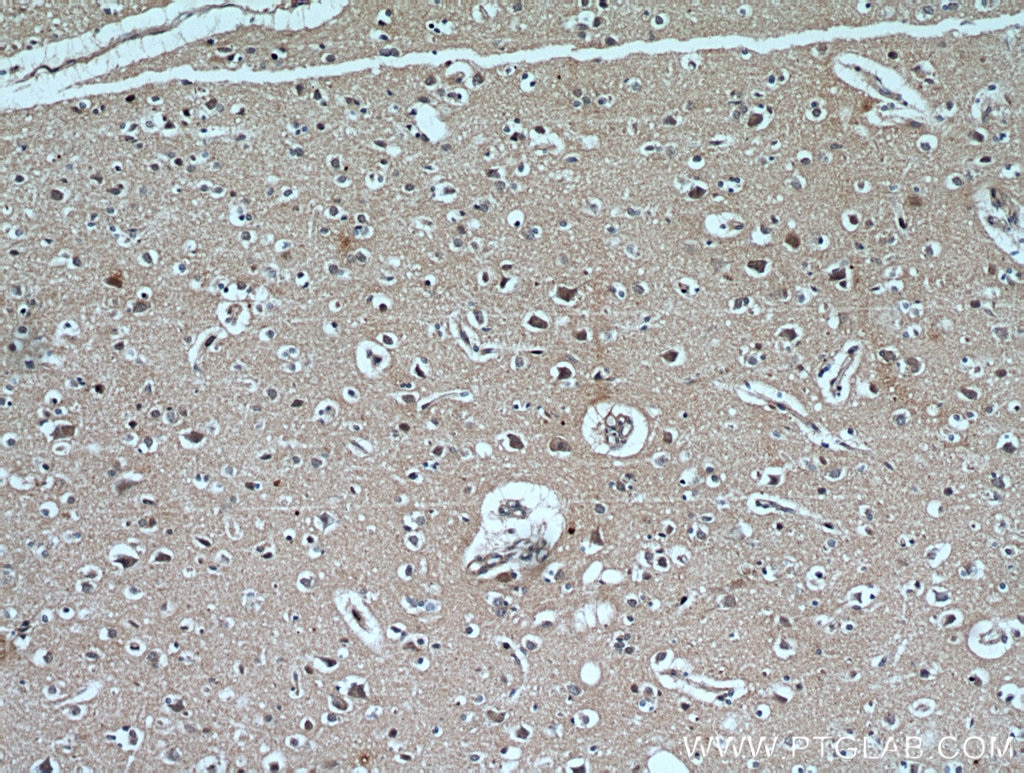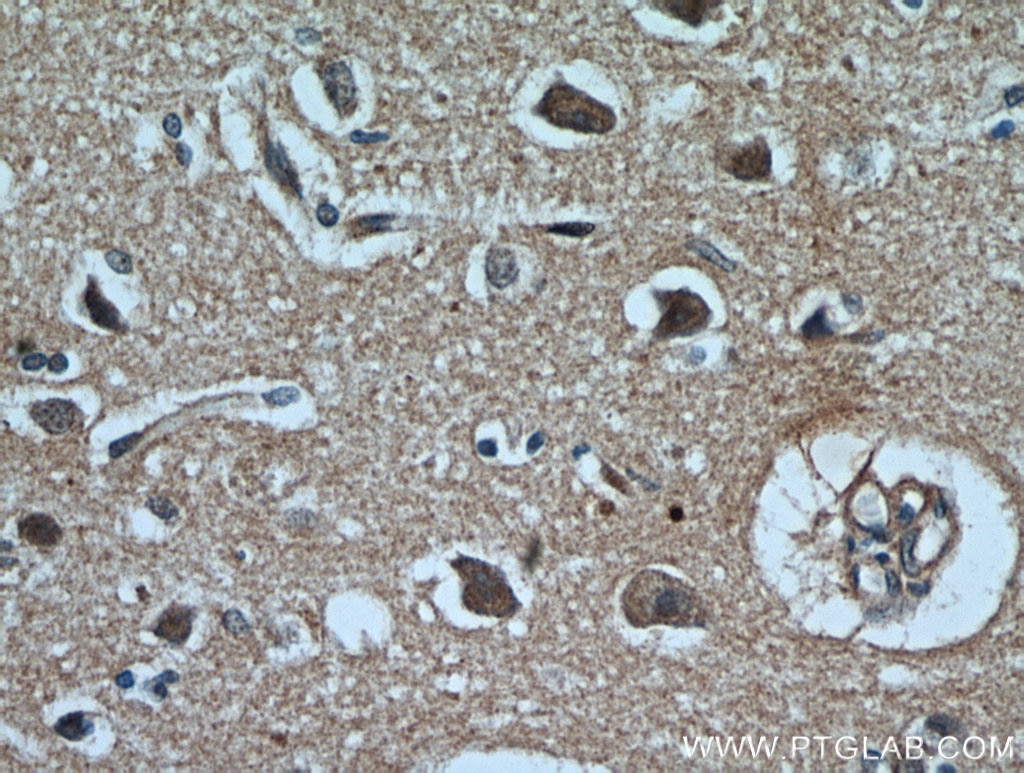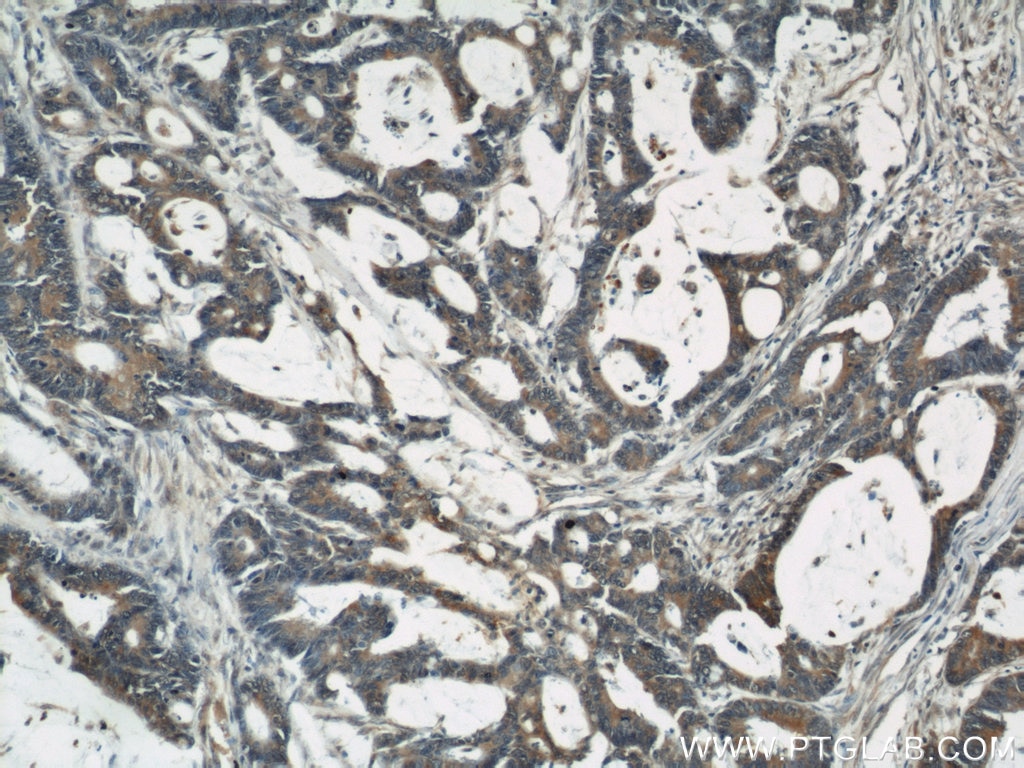Tested Applications
| Positive WB detected in | mouse brain tissue, HEK-293 cells, A431 cells, Jurkat cells |
| Positive IP detected in | mouse brain tissue |
| Positive IHC detected in | human colon cancer tissue, human brain tissue, human colon tissue Note: suggested antigen retrieval with TE buffer pH 9.0; (*) Alternatively, antigen retrieval may be performed with citrate buffer pH 6.0 |
Recommended dilution
| Application | Dilution |
|---|---|
| Western Blot (WB) | WB : 1:500-1:2000 |
| Immunoprecipitation (IP) | IP : 0.5-4.0 ug for 1.0-3.0 mg of total protein lysate |
| Immunohistochemistry (IHC) | IHC : 1:50-1:500 |
| It is recommended that this reagent should be titrated in each testing system to obtain optimal results. | |
| Sample-dependent, Check data in validation data gallery. | |
Published Applications
| KD/KO | See 7 publications below |
| WB | See 24 publications below |
| IHC | See 5 publications below |
| IF | See 2 publications below |
| IP | See 2 publications below |
Product Information
11110-1-AP targets CYLD in WB, IHC, IF, IP, ELISA applications and shows reactivity with human, mouse, rat samples.
| Tested Reactivity | human, mouse, rat |
| Cited Reactivity | human, mouse, rat |
| Host / Isotype | Rabbit / IgG |
| Class | Polyclonal |
| Type | Antibody |
| Immunogen |
CatNo: Ag1598 Product name: Recombinant human CYLD protein Source: e coli.-derived, PGEX-4T Tag: GST Domain: 654-953 aa of BC012342 Sequence: TKIMKLRKILEKVEAASGFTSEEKDPEEFLNILFHHILRVEPLLKIRSAGQKVQDCYFYQIFMEKNEKVGVPTIQQLLEWSFINSNLKFAEAPSCLIIQMPRFGKDFKLFKKIFPSLELNITDLLEDTPRQCRICGGLAMYECRECYDDPDISAGKIKQFCKTCNTQVHLHPKRLNHKYNPVSLPKDLPDWDWRHGCIPCQNMELFAVLCIETSHYVAFVKYGKDDSAWLFFDSMADRDGGQNGFNIPQVTPCPEVGEYLKMSLEDLHSLDSRRIQGCARRLLCDAYMCMYQSPTMSLYK Predict reactive species |
| Full Name | cylindromatosis (turban tumor syndrome) |
| Calculated Molecular Weight | 107 kDa |
| Observed Molecular Weight | 110 kDa |
| GenBank Accession Number | BC012342 |
| Gene Symbol | CYLD |
| Gene ID (NCBI) | 1540 |
| RRID | AB_10915966 |
| Conjugate | Unconjugated |
| Form | Liquid |
| Purification Method | Antigen affinity purification |
| UNIPROT ID | Q9NQC7 |
| Storage Buffer | PBS with 0.02% sodium azide and 50% glycerol, pH 7.3. |
| Storage Conditions | Store at -20°C. Stable for one year after shipment. Aliquoting is unnecessary for -20oC storage. 20ul sizes contain 0.1% BSA. |
Background Information
CYLD, also named as CYLD1, belongs to the peptidase C67 family. It is the protease that specifically cleaves 'Lys-63'-linked polyubiquitin chains. CYLD has endodeubiquitinase activity and plays an important role in the regulation of pathways leading to NF-kappa-B activation. CYLD contributes to the regulation of cell survival, proliferation and differentiation via its effects on NF-kappa-B activation. It is a negative regulator of Wnt signaling. CYLD inhibits HDAC6 and thereby promotes acetylation of alpha-tubulin and stabilization of microtubules. CYLD plays a role in the regulation of microtubule dynamics, and thereby contributes to the regulation of cell proliferation, cell polarization, cell migration, and angiogenesis. It is required for normal cell cycle progress and normal cytokinesis. CYLD inhibits nuclear translocation of NF-kappa-B and plays a role in the regulation of inflammation and the innate immune response, via its effects on NF-kappa-B activation. It is dispensable for the maturation of intrathymic natural killer cells, but required for the continued survival of immature natural killer cells. CYLD negatively regulates TNFRSF11A signaling and osteoclastogenesis. This antibody is a rabbit polyclonal antibody raised against residues near the C terminus of human CYLD.
Protocols
| Product Specific Protocols | |
|---|---|
| IHC protocol for CYLD antibody 11110-1-AP | Download protocol |
| IP protocol for CYLD antibody 11110-1-AP | Download protocol |
| WB protocol for CYLD antibody 11110-1-AP | Download protocol |
| Standard Protocols | |
|---|---|
| Click here to view our Standard Protocols |
Publications
| Species | Application | Title |
|---|---|---|
Nat Cell Biol TRIM15 and CYLD regulate ERK activation via lysine-63-linked polyubiquitination.
| ||
Cancer Lett CYLD deficiency enhances metabolic reprogramming and tumor progression in nasopharyngeal carcinoma via PFKFB3. | ||
Arterioscler Thromb Vasc Biol CYLD Deubiquitinates Nicotinamide Adenine Dinucleotide Phosphate Oxidase 4 Contributing to Adventitial Remodeling. | ||
Sci Total Environ USP15 participates in DBP-induced testicular oxidative stress injury through regulating the Keap1/Nrf2 signaling pathway.
| ||
iScience Centrosomal protein 120 promotes centrosome amplification and gastric cancer progression via USP54-mediated deubiquitination of PLK4 | ||
Chem Biol Interact miR-501 is upregulated in cervical cancer and promotes cell proliferation, migration and invasion by targeting CYLD.
|

